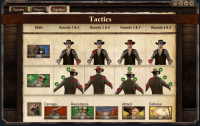Duels: Difference between revisions
Futurama1001 (talk | contribs) |
|||
| Line 110: | Line 110: | ||
===Motivation=== | ===Motivation=== | ||
With each duel the motivation goes down by 3 points. A lower motivation means that less experience points are received. With a motivation of 50% the winner only receives half of the calculated points. It is always your own motivation that counts even if the defender wins | With each duel the motivation goes down by 3 points. A lower motivation means that less experience points are received. With a motivation of 50% the winner only receives half of the calculated points. It is always your own motivation that counts even if the defender wins. | ||
==Duels against NPCs== | ==Duels against NPCs== | ||
Revision as of 07:39, 14 June 2013
Duels
A duel is the fight between 2 players. To challenge other players you have to be member of a town and your town needs a mortician.
The defending player does not have to be online for you to challenge him. However, you cannot challenge players that are asleep in a hotel or barracks, or at a fort gate waiting for a battle to start.
Every duel costs 12 energy points for the challenger. The defender does not lose any energy. The costs are independent of the outcome of the duel.
You can stop the duel before the 10 minutes counts to 0, and the other player will not know you challenged them. Note you will not lose the 12 energy points for canceling a duel early. If you duel a player who was sleeping you will lose 12 energy points.
In the "Duel" menu you can change your dueling settings.
Challenging a player
A duel can be initiated in three ways:
- By clicking the "Challenge to a duel" button in the player's profile.
- By clicking the player's location on the map and clicking the "Duel" button next to his name.
- By clicking the "duel" link next to the player's name in his town's saloon.
A duel takes place at the location of the defender when the challenge was issued. This means that the challenger must be at the same location as the defender or the travel time to the defender's location will be added to the 10 minute duel time.
The duel
A duel is separated into 8 rounds. Each player has eight chances to try to land a hit and eight changes to dodge the attack from the other one. To land a hit you need good attack value. To evade a hit you need a good defense value.
Attack value
The attack value is decided by your aiming skill.
Either the attack value of the attacker or the attack value of the defender is lowered. With the skill 'tactics' the defender is able to use his home advantage. He chooses the side on which he stands and uses the knowledge of the town. The attacker uses his appearance to intimidate the defender. If the tactic skill of the defender is higher than the appearance skill of the attacker, the attackers attack value goes down. If it is lower, the attack value of the defender goes down. The bigger the difference between the skills, the more the attack value is lowered.
Additionally each player receives a bonus of five for the attack value.
Dodging skill
The defense skill is decided by your dodging skill.
Additionally each player receives a bonus of five for the dodging value.
Exchange of fire
In every fight each of the fighters attacks eight times. Both fighters have eight chances to land a hit and to cause damage. The attacker is the first to attack. The fighters can use melee weapons or firearms. In the explanation below we explain the duel just based on firearms to make it less complicated.
With each shot the attack value of the attacker is compared to the defense value of the defender. For this a random value is taken between one and the attack value, and a random value between one and the defense value. If the attack value is higher, the attacker lands a hit and causes damage. If the value lower, the shot doesn't hit its target and no damage is done. Now it's time for the current defender to attack.
Damage
Damage is caused when one player lands a hit, meaning, his attack value is higher than the defenders defense value. The amount of damage is decided by the attackers weapon. Every weapon has a minimal and maximal number for the damage it causes. Every time a hit is landed a random value somewhere between those numbers is taken. The defender loses the calculated amount of health points.
There are two different dueling weapon classes. Melee weapons and firearms. The damage that is done with a melee weapon is increased by good vigor skills and it is mostly lowered by good toughness skills of the defender. For firearms the damage is increased by good shooting skills and lowered mostly by good reflexes of the defender. A player that has good vigor skills should therefore rather use a melee weapon than a firearm.
Striking zones
You can set a dueling tactic by clicking on the menu 'Duel'. By setting the striking and dodging zones you can also alter the damage.
Here you can set a few different things. For one you can set where you want to aim. Depending on the area you hit you make different amounts of damage. If you hit a shoulder you make 15% more damage. Hitting the head creates 50% more damage.
You can also set which way you are trying to dodge. If you dodge with the body part that the attacker was aiming at, your dodging skill gets doubled.
- You can just duck down and by that protect the head and both shoulders.
- You can duck to the left and protect your head, your right shoulder and your right arm.
- You can duck to the right and protect your head, your left shoulder and your left arm.
- You can choose not to try to dodge and have more concentration for the next round. This doubles your attack value.
A duel lasts 8 rounds. The settings for round one are also used for round 5 and so on.
Winning a duel
The player that causes more damage in the duel wins. If both players cause the exact same amount of damage, the defender wins. If a player loses all his health points in the duel, he passes out. In this case the other player is always the winner of the duel even if he caused less damage.
Dueling requirements
There are a few conditions for starting a duel. Some players may not challenge each other.
- The defender has to be member of a town
- The challenger has to be member of a town. This town also needs a mortician.
- The challenger has to visit the location of the defender.
- Dueler class players can initiate duels in a 15 minutes (30 with "Character" premium enabled) without the need to travel to the location
- The challenger needs at least 12 energy points (only 5 energy points is needed when initiating a duel against an NPC from the "Duel" tab. More info on these NPCs can be found here).
- Both players have to be able to gain experience points from the duel. These are calculated from the dueling level.
- You may not challenge the same player more than once per hour.
- The defender may not have been knocked out within the last 48 hours.
- The challenger may not have been knocked out within the last 48 hours.
- The defender cannot be sleeping in a hotel unless they have initiated a duel within the previous 45 minutes.
- The defender cannot be at a fort battle location unless they have initiated a duel within the previous 45 minutes.
Bounties
- You can duel townless players with a bounty on their head.
- Once the bounty is collected, they can no longer be duelled.
- You cannot place a bounty on a townless player.
Dueling reward
The winner of the a duel gets two rewards.
The winner receives a part of the cash the defender was carrying around. If the defender doesn't carry any money, the winner doesn't receive anything. If the defender gets knocked out he loses all his cash. The winner still only gets some of it.
The winner also receives experience points for the duel. How many points are received depends on the dueling level of the opponent.
Experience = (7 * dueling level of loser) - (5 * dueling level of winner)
+ 5
The winner receives at least 5 experience points.
Dueling level
The dueling level of a player is calculated from his character level and the experience points the player has earned in duels. The more points were received, the higher the dueling level
Motivation
With each duel the motivation goes down by 3 points. A lower motivation means that less experience points are received. With a motivation of 50% the winner only receives half of the calculated points. It is always your own motivation that counts even if the defender wins.
Duels against NPCs
NPCs from the "Duel" tab
There is, as of version 1.28, the option to duel against Non-Player Characters by clicking on the "Duel" tab where you would normally go to adjust your aim/dodge stances. A list of NPCs is shown on this screen, and by mousing over each NPC you can see their duel skills, weapon and health points.
You gain both money and experience points from beating an NPC, but also lose a portion of your money if you lose. Note: You do not receive experience towards your dueling level.
If an NPC from this list passes you out, you do not receive the 48-hour safe period, but still lose all your health, energy and on hand cash and wake up in your town's hotel.
NPCs from quests
Duels against quest givers work the same way as other duels against players. There are however two major differences:
- The Quest opponent does not take any money from you, even if you lose the duel.
- You can challenge a quest opponent as often as you want, until you win the duel. There is no waiting time like with challenging other players.
- Sometimes you are asked to win against a NPC, other times you are asked to Kill the NPC.
Careful: Even against a questgiver you can pass out and by that lose all of your money.





















